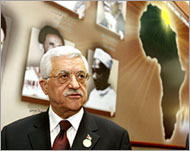Fatah meet a damp squib
Despite its high-profile, the Fatah central committee meeting in Amman earlier this week seems to have failed to resolve the internal crises and divisions afflicting the movement.

Veteran Fatah leaders, including Palestinian Authority President Mahmoud Abbas, and Fatah chief Farouq Qaddumi voiced satisfaction at the decisions adopted by the movement’s top brass, especially an invitation to Hamas to join a possible government of national unity.
The top Fatah leadership also reasserted its rejection of the concept of a state with interim borders as proposed by some in Israel and the US.
However, for the bulk of Fatah’s rank and file and grassroots supporters in the West Bank and Gaza Strip, the Amman meeting was a fiasco.
Contested decision
The decision by Fatah executive leaders to postpone the Fatah general convention until after the legislative elections, which were to take place on 17 July, has upset many Fatah activists and junior leaders.
One of them is Fatah leader and Legislative Council member Hatem Abdul Qader, who has been calling for the introduction of democratic reforms “to save Fatah from itself”.
 |
|
Abbas is under pressure to hold |
He says the decision to delay the convention showed that the Fatah’s veteran leaders were more interested in retaining their “chairs” and less in the viability and survivability of the movement.
“We had hoped the meeting would shake the stagnant water in Fatah and allow new blood into its veins. However, instead of that, we got a great disappointment from Amman,” the Palestinian lawmaker told Aljazeera.net.
Abdul Qader accused the leadership of wanting to “superimpose their hand-picked candidates on Fatah in a manner resembling a parachute landing”.
He and his allies, including imprisoned Fatah leader Marwan al-Barghuthi, have been demanding for sometime that Fatah’s primaries be held before the legislative elections in order to allow the grassroots cadres and members, who are in the tens of thousands, to freely and democratically choose their candidates for the general elections.
However, such demands have been consistently resisted by Fatah’s veteran leaders, a resistance some say stems from fear of being sidelined or even voted out by the movement’s disenchanted younger generations.
Multiple Fatah lists
Abdul Qader argued that “this destructive centralism” in Fatah was corroding the movement from within.
He further warned that unless there was credible internal elections in Fatah, there would be multiple Fatah lists for the upcoming legislative elections, including one headed by al-Barghuthi.
His concerns are shared by many Palestinian analysts who have interpreted the Palestinian Authority invitation to Hamas to join a possible national unity government as merely a smokescreen to distract attention from the “Amman fiasco”.
Hamas initially said it would study the invitation favourably.
|
“We won’t be part of any efforts to rob the Palestinian masses of their right to freely elect their leaders and representatives” Mahmoud al-Zahar, |
However, after brief consultations with the movement’s leaders in Lebanon and Syria, the Hamas leadership in the Gaza Strip announced its rejection of the idea, calling it a “distraction” and accusing the PA of seeking to evade legislative elections.
“We won’t be part of any efforts to rob the Palestinian masses of their right to freely elect their leaders and representatives,” said Hamas leader in Gaza Mahmoud al-Zahar.
He urged the PA to set “sooner rather than later” a new date for the elections.
Counter offer
Hamas has sought to counter the PA’s national unity government offer with a proposal of its own.
Hamas leaders have been urging the PA government to form n broad-based body that would include the PA itself and representatives of all Palestinian political factions to oversee the administration of the Gaza Strip following the Israeli withdrawal, set to take place in the middle of August.
Hamas argues such a body or committee would ensure a smooth transition of power and prevent the occurrence of any unnecessary intra-Palestinian frictions.
But the PA rejected the proposal, reiterating the long-standing mantra that there is only one Palestinian Authority and government and that all Palestinians would have to heed its decisions.
According to Palestinian columnist Hani al-Masri, the PA leadership hopes the Israeli withdrawal from Gaza will provide a badly-needed booster for Fatah which would place the movement in a better position vis-a-vis Hamas.